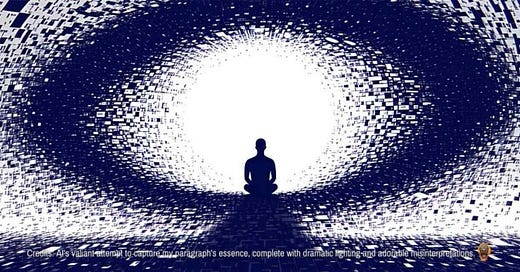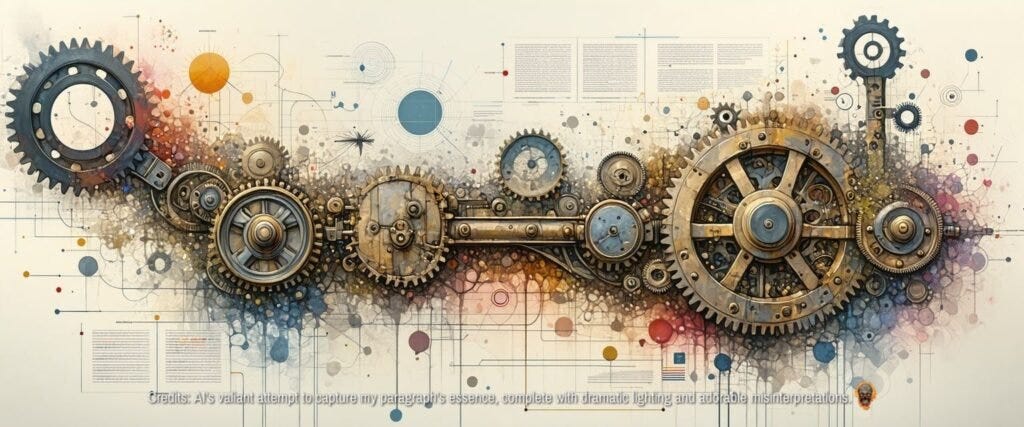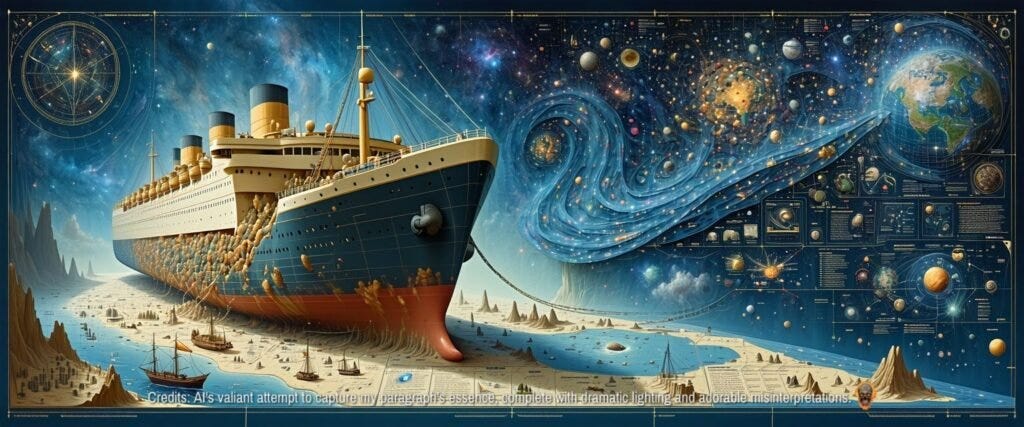So, you think you’re the captain of your ship, the master of your fate? Cute. Adorable, even.
This whole free will charade – it’s the universe’s longest-running gag, and guess what? You’re the punchline. For centuries, philosophers have tied themselves in knots, theologians have pontificated, and now even the lab coats are chiming in, all trying to nail down this slippery phantom called free will.
Is it real? Is it an illusion? Are you a sovereign being, or just a meat puppet dancing to the tune of causality? Spoiler alert: it’s worse than you think. Or maybe, just maybe, it’s better. Depends on how attached you are to your precious little self, the one you imagine is calling all the shots. We’re going to rip the bandages off this one. We’ll look at the standard story, the one that props up your ego and makes you feel important. Then we’ll kick over the anthill and see what scurries out when the cold light of nondual reality hits it. This isn’t about comforting bedtime stories or philosophical hair-splitting. This is about waking up to what is, not what you wish it were.
If you’re looking for validation of your specialness, you’re in the wrong place. If you’re ready to confront the mirage, to see the strings on the puppet, then maybe, just maybe, you’re ready for this. But don’t say I didn’t warn you. The truth doesn’t care about your precious feelings…
…and neither do I.
The Conventional Straitjacket: Why You Cling to the Lie of Free Will
Let’s start with the basics, the stuff they spoon-feed you from day one.
You feel like you make choices, right? Coffee or tea? Turn left or right? Love or hate? It sure seems like there’s a little CEO in your head, weighing options, making executive decisions, and taking full credit (or blame) for the outcomes. This is the bedrock of the dualistic view: a separate, independent you, endowed with the magical power of volition, navigating a world of cause and effect like a tiny god in your own personal universe.
Philosophers have dressed this up in fancy language for millennia. They talk about libertarian free will – the idea that you could have genuinely chosen otherwise, that your choices are not predetermined by the relentless chain of causality. They construct elaborate arguments about moral responsibility, arguing that without this special brand of freedom, society would crumble, justice would be a joke, and we’d all be off the hook for our screw-ups. It’s a comforting narrative, isn’t it? It makes you the hero (or villain) of your own story. It gives meaning to your struggles and significance to your triumphs.
This subjective feeling of freedom is a powerful drug. It’s the cornerstone of legal systems, religious doctrines, and personal relationships. “I choose, therefore I am… responsible.” It’s the ego’s favorite mantra. Because if there’s no chooser, what happens to the precious self? What happens to accountability, praise, blame, sin, and redemption? The whole edifice of human drama seems to teeter on this single point of an independent will.
This isn’t just some abstract philosophical debate. It’s deeply personal. The belief in your own agency, your power to steer your life, is probably one of the most fundamental assumptions you hold. It’s the invisible framework upon which you’ve built your identity, your aspirations, your regrets. To question it is to question the very foundation of who you think you are. And that, my friend, is precisely what we’re here to do. Because that foundation? It’s built on sand. Quicksand, actually. And the tide is coming in.
The conventional view of free will isn’t a pathway to freedom; it’s a straitjacket. It binds you to a fictional character…
…a self-important ghost in the machine that you’ve mistaken for the driver.
Cracks in the Foundation: Scientific and Cross-Cultural Pointers
So, you’re still clinging to your little security blanket of personal agency? Again, how adorable.
Let’s see how well it holds up when we start yanking on a few threads. The ivory tower eggheads and the lab-coat crowd have been poking at this free will delusion for a while now, and even they’re starting to see the emperor has no clothes. And if you dare to look beyond your own backyard, you’ll find the rest of the world isn’t nearly as obsessed with your precious individual choice as you are.
Neuroscience | The Brain Called: “You’re Not in Charge!”
Ever heard of Benjamin Libet?
Back in the 80s, this guy and his buddies wired people up and basically found out your brain makes a decision before you even know you’ve made it.
They saw this blip of brain activity, the ‘readiness potential,’ firing off a good half-second before people reported consciously deciding to flick their wrist. Half a second. An eternity in brain time. So much for your conscious will being the grand initiator. It’s more like the press secretary, showing up late to announce what the real boss already decided in a back room you didn’t even know existed.
Of course, the philosophers and the apologists for free will threw a fit. “Oh, but the W-time is unreliable!” “The readiness potential is just preparation, not the decision itself!” Blah, blah, blah. They squawked and flapped, but the evidence kept piling up. Later studies with fancier brain scanners (fMRI, for the geeks) claimed they could predict your choices a whopping seven to ten seconds before you were consciously aware of them. Ten seconds! Your brain’s already moved on to the next item on the agenda while your conscious self is still fumbling for the ‘decide’ button.
Some try to salvage a shred of dignity by pointing to a ‘veto power’ – maybe you can’t start the action, but you can stop it! Whoop-de-doo. That’s like saying you can’t steer the runaway train, but you might, just might, be able to pull the emergency brake if you’re quick enough and the brakes haven’t already been cut. It’s a pathetic consolation prize for a dethroned king.
More recent takes suggest this readiness potential isn’t even a specific decision signal, but more like the background hum of your brain’s machinery, a random fluctuation that occasionally crosses a threshold and, whoops, there goes an action. Your conscious experience of deciding? That’s just the story your brain spins after the fact to make sense of it all, to maintain the illusion that there’s a ‘you’ in there pulling the levers. It’s a post-hoc rationalization, a neat little narrative package to keep the ego from having a meltdown.
The science, if you’re brave enough to look at it without flinching, points to a system operating largely on autopilot, with self-awareness as a bewildered passenger who occasionally gets handed a fake steering wheel…
…to keep it occupied.
Cross-Cultural Perspectives: Your Free Will Isn’t Everyone’s Fetish
And here’s another kick in the pants for your self-importance:
Keep reading with a 7-day free trial
Subscribe to NirvanaNuke: The Ultimate Unveiling to keep reading this post and get 7 days of free access to the full post archives.







